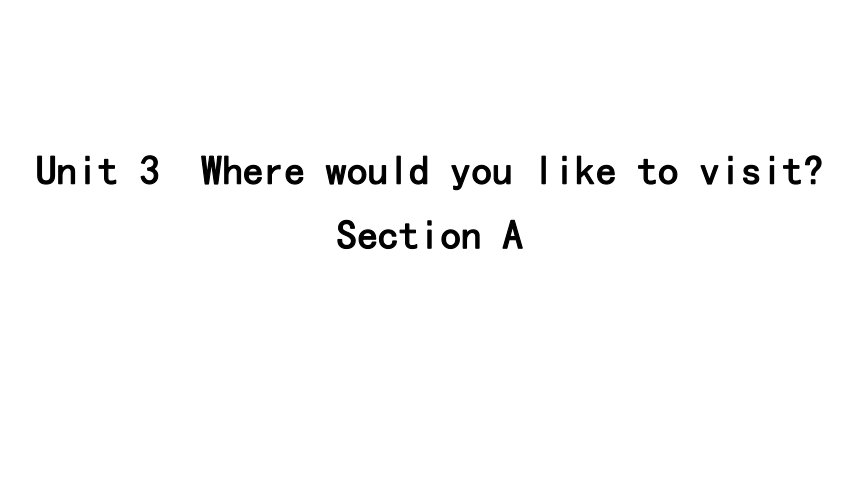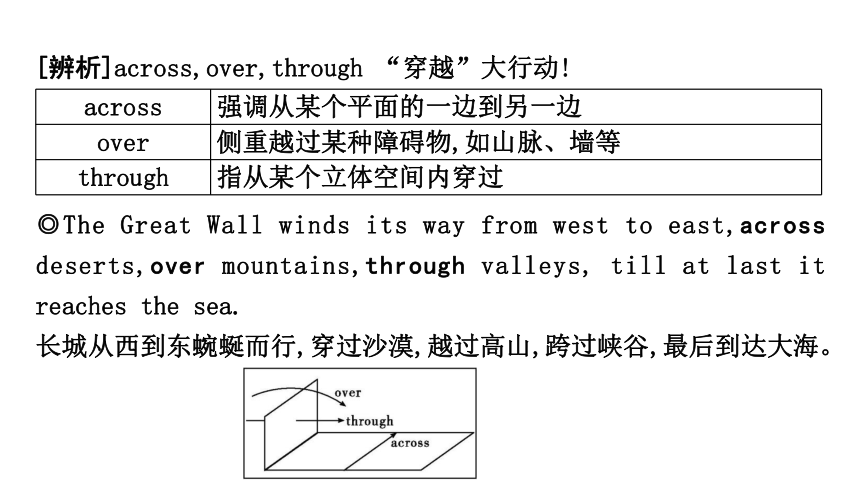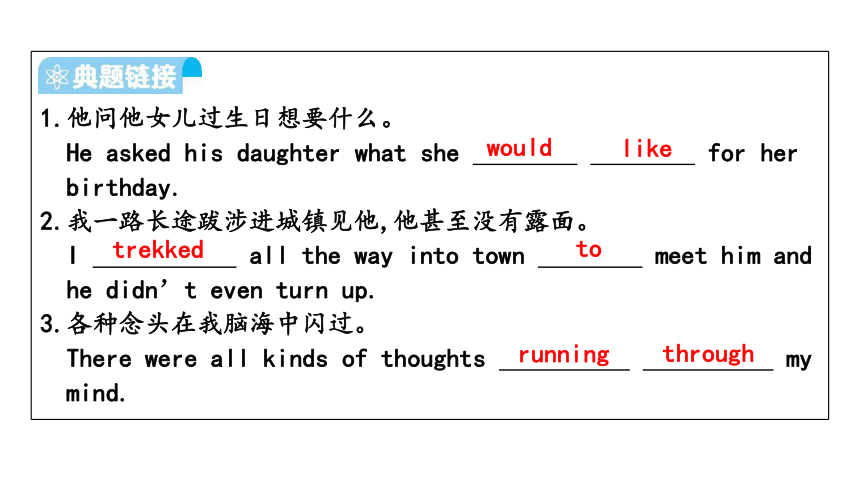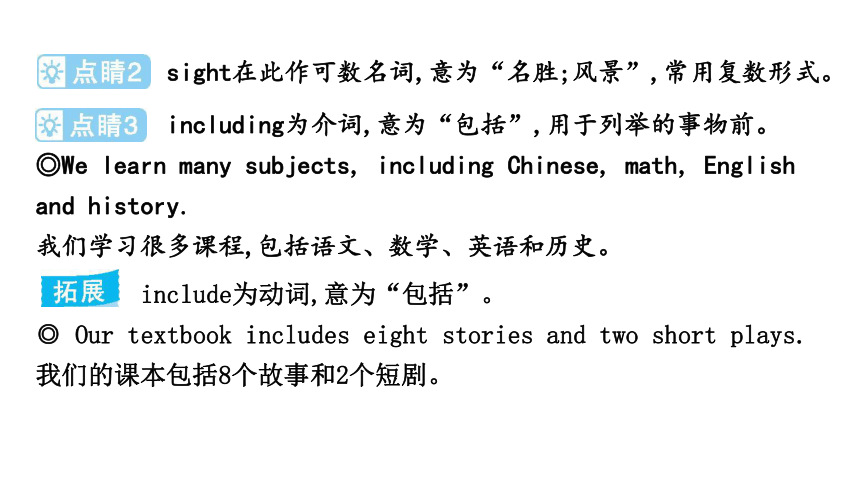2023-2024学年英语鲁教版(五四学制)八年级下册Unit 3Where would you like to visit?复习课件(共34张PPT)
文档属性
| 名称 | 2023-2024学年英语鲁教版(五四学制)八年级下册Unit 3Where would you like to visit?复习课件(共34张PPT) |  | |
| 格式 | pptx | ||
| 文件大小 | 222.1KB | ||
| 资源类型 | 教案 | ||
| 版本资源 | 鲁教版 | ||
| 科目 | 英语 | ||
| 更新时间 | 2024-07-06 10:44:30 | ||
图片预览












文档简介
(共34张PPT)
Unit 3 Where would you like to visit
Section A
I’d like to trek through the jungle,because I like exciting vacations.我想徒步穿越丛林,因为我喜欢令人兴奋的假期。(P17)
I’d like 为I would like的缩写,would like意为“想要”,后接名词、代词、动词不定式作宾语。
◎I’d like to sail across the Pacific.
我想横渡太平洋。
◎I’d like some bread.我想要一些面包。
trek意为“(缓慢或艰难地)旅行;长途跋涉”,为不及物动词。其过去式、过去分词为trekked。
◎He trekked across the mountains for five days.
他在群山里长途跋涉了5天。
through作介词,意为“通过;穿过”。
◎We met a bear when walking through the forest.
我们正穿过森林时遇到了一只熊。
[辨析]across,over,through “穿越”大行动!
across 强调从某个平面的一边到另一边
over 侧重越过某种障碍物,如山脉、墙等
through 指从某个立体空间内穿过
◎The Great Wall winds its way from west to east,across deserts,over mountains,through valleys, till at last it reaches the sea.
长城从西到东蜿蜒而行,穿过沙漠,越过高山,跨过峡谷,最后到达大海。
1.他问他女儿过生日想要什么。
He asked his daughter what she for her
birthday.
2.我一路长途跋涉进城镇见他,他甚至没有露面。
I all the way into town meet him and
he didn’t even turn up.
3.各种念头在我脑海中闪过。
There were all kinds of thoughts my
mind.
would
like
trekked
to
running
through
For your next vacation, why not consider visiting Paris 对于你的下个假期,你为什么不考虑游览巴黎呢 (P19)
Why not do sth. =Why don’t you do sth. 意为“你为什么不做某事呢 ”,表示建议。
◎Why not attend the community event with us
为什么不和我们一起参加社区活动呢
consider是及物动词,意为“考虑”,相当于think about, 其后接名词、动名词、“疑问词+不定式”结构或宾语从句。如:
◎She is considering buying a new car.
她正在考虑买辆新车。
◎We considered what we could do to help the homeless people.
我们考虑了我们能做些什么来帮助无家可归的人。
跟动名词作宾语的动词或短语的口诀如下:
喜欢(enjoy)不断(keep)提建议(suggest);
避免(avoid)介意(mind)已完毕(finish/end up);
考虑(consider)习惯(be/get used to)莫放弃(give up)。
1.Why not (introduce) your friend to me just
now
2.He is considering (study) abroad.
3.Do you enjoy (work) with children
introduce
studying
working
For example, it has some fantastic sights, including the Eiffel Tower and the Notre Dame Cathedral, one of the most famous churches in the world.例如,它有一些非常迷人的景点,包括埃菲尔铁塔和巴黎圣母院——世界上最著名的教堂之一。(P19)
在本句中including介词短语对fantastic sights进行补充说明;one of the most famous churches in the world作the Notre Dame Cathedral的同位语。
sight在此作可数名词,意为“名胜;风景”,常用复数形式。
including为介词,意为“包括”,用于列举的事物前。
◎We learn many subjects, including Chinese, math, English and history.
我们学习很多课程,包括语文、数学、英语和历史。
include为动词,意为“包括”。
◎ Our textbook includes eight stories and two short plays.我们的课本包括8个故事和2个短剧。
“one of the+形容词最高级+名词复数+比较范围”意为“……中最……的……之一” 。
◎This is one of the best books in the library.
这是图书馆中最好的书之一。
1.Six people were killed in the accident, (include)
a policeman.
2.The Great Wall is one of (wonderful)
sights in the world.
including
the most wonderful
So unless you speak French yourself, it’s best to travel with someone who can translate things for you.所 以,除非你自己讲法语,否则最好与某个能为你翻译的人一起旅行。(P19)
unless意为“除非;如果不”,引导条件状语从句,相当于“if...not”。
◎The boy won’t go to sleep unless you tell him a story.如果你不给这个小男孩讲故事,他就不去睡觉。
translate sth.for sb.意为“为某人翻译某事/物”。translate...into...意为“把……翻译成……”。translate为动 词,其名词形式为translation。
◎Please translate the poem into English for me.
请为我把这首诗翻译成英语。
1.如果不下雨,我们将步行去学校。
a.We will go to school on foot it .
b.We will walk to school it rain.
2.你能把这篇文章翻译成英语吗
Can you the article English
unless
rains
if
doesn’t
translate
into
Isn’t it supposed to be very hot
难道不是应该很热吗 (P20)
这是一个否定疑问句,意为“难道不……吗 ”。回答时,肯定的事实用Yes作答;否定的事实用No作答。注意No译作“是的”; Yes译作“不”。
◎—Isn’t it delicious
难道它不可口吗
—Yes, it is./No, it isn’t.
不,它很可口。/是的,它不可口。
suppose意为“推断;料想”,作动词。be supposed to 意为“应该……”,相当于should。
◎You are supposed to do your homework now.
现在你应该去做作业。
1.“难道你不喜欢它吗 ”
“是的,我不喜欢。”
— you like it
— , I don’t.
2.我们应该先打扫我们教室。
We clean up our classroom
first.
Don’t
No
are
supposed
to
Section B
Here are some of the findings of a survey about hopes and dreams, in which thousands of students across China took part.这儿有一些由全中国数千名学生参与的,有关希望和梦想的调查的结果。(P22)
in which...为非限制性定语从句,修饰前面的名词survey。介词提前,which不可省略。in与从句中的took part构成短语,意为“参与;参加”,in不能省略。
◎This is an old house,in which my grandparents have lived for nearly 30 years.这是一所老房子,我的祖父母已经在这里住了将近30年。
thousands of意为“成千上万的;数以千计的”,其后接可数名词复数。表示确切数量时,thousand后不加-s,前面加具体的数字。表示大约数量时,其后加-s,后面跟of。
◎There are thousands of tourists visiting the island on May Day every year.每年五一劳动节这天有数以千计的游客游览这个 小岛。
◎Five thousand people flew to Paris last Friday.
上周五5 000人乘飞机去巴黎。
约数的表示方法如下:
hundreds of 成百上千的……
millions of 数百万的……
billions of 数十亿的……
1. (thousand)of tourists come to visit Mount Tai
every day.
2.There are about two (thousand) students in
this school.
Thousands
thousand
It seems some students would like to start work as soon as possible, so that they can help provide better lives for their parents.
似乎有些学生想要尽快开始工作,以便他们能够有助于为他们父母提供更好的生活。(P22)
It seems (that)...意为“似乎……;看起来好像……”,通常用于表示根据某些见到的迹象进行推断。
◎It seemed that nobody knew what had happened.
似乎没有人知道发生了什么。
as soon as possible意为“尽快地”,相当于as soon as one can。
◎I hope to hear from you as soon as possible.
我希望尽快收到你的回信。
so that引导目的状语从句,意为“以便;为了”,该从句中常含有情态动词。如:
◎I came to the class early so that I could meet him.
我早早地来上课,以便我能遇到他。
so that还可引导结果状语从句,意为“因此;所以”。
◎The bus broke down, so that we had to walk.
公共汽车抛锚了,结果我们不得不步行。
provide sth.for sb.= provide sb.with sth.意为“为某人提供某物”。
They provide food for us.=They provide us with food.他们为我们提供食物。
1.It seems that he didn’t tell the truth.
2.这个宾馆给我们提供了一个大房间。
a.This hotel us a large room.
b.This hotel a large room us.
似乎他没有说实话。
provides
with
provides
for
And quite a few said they dream of going to the moon one day.相当多的青少年说他们梦想着有一天去月球。(P22)
quite a few意为“相当多,颇多”,后接可数名词复数。
◎Frank has quite a few friends there.
弗兰克在那里有相当多朋友。
a few和 a little意为“一些;几个”(表肯定意义);few和little意为“几乎没有”(表否定意义)。a few, few修饰可数名词;a little, little修饰不可数名词。
dream of意为“梦想”,dream是动词,其过去式和过去分词均为dreamt或dreamed。
◎She dreamed/dreamt of being a famous writer.
她梦想成为一名著名的作家。
1.我表姐梦想长大后成为一名医生。
My cousin becoming a doctor when she
grows up.
2.这个男孩才五岁,但他已经学习了相当多汉字了。
The boy is only five, but he has already learned .
Chinese characters.
dreams
of
quite
a
few
...but many students reported that they were willing to work hard to achieve their dreams.……但是很多学生说他们愿意努力学习去实现他们的梦想。(P22)
be willing to do sth.意为“乐意做某事”,be willing to help others意为“乐于助人”。
◎How much are they willing to pay
他们愿意付多少钱
没有人愿意冒这个险。
There are no people take the risk.
willing
to
Unit 3 Where would you like to visit
Section A
I’d like to trek through the jungle,because I like exciting vacations.我想徒步穿越丛林,因为我喜欢令人兴奋的假期。(P17)
I’d like 为I would like的缩写,would like意为“想要”,后接名词、代词、动词不定式作宾语。
◎I’d like to sail across the Pacific.
我想横渡太平洋。
◎I’d like some bread.我想要一些面包。
trek意为“(缓慢或艰难地)旅行;长途跋涉”,为不及物动词。其过去式、过去分词为trekked。
◎He trekked across the mountains for five days.
他在群山里长途跋涉了5天。
through作介词,意为“通过;穿过”。
◎We met a bear when walking through the forest.
我们正穿过森林时遇到了一只熊。
[辨析]across,over,through “穿越”大行动!
across 强调从某个平面的一边到另一边
over 侧重越过某种障碍物,如山脉、墙等
through 指从某个立体空间内穿过
◎The Great Wall winds its way from west to east,across deserts,over mountains,through valleys, till at last it reaches the sea.
长城从西到东蜿蜒而行,穿过沙漠,越过高山,跨过峡谷,最后到达大海。
1.他问他女儿过生日想要什么。
He asked his daughter what she for her
birthday.
2.我一路长途跋涉进城镇见他,他甚至没有露面。
I all the way into town meet him and
he didn’t even turn up.
3.各种念头在我脑海中闪过。
There were all kinds of thoughts my
mind.
would
like
trekked
to
running
through
For your next vacation, why not consider visiting Paris 对于你的下个假期,你为什么不考虑游览巴黎呢 (P19)
Why not do sth. =Why don’t you do sth. 意为“你为什么不做某事呢 ”,表示建议。
◎Why not attend the community event with us
为什么不和我们一起参加社区活动呢
consider是及物动词,意为“考虑”,相当于think about, 其后接名词、动名词、“疑问词+不定式”结构或宾语从句。如:
◎She is considering buying a new car.
她正在考虑买辆新车。
◎We considered what we could do to help the homeless people.
我们考虑了我们能做些什么来帮助无家可归的人。
跟动名词作宾语的动词或短语的口诀如下:
喜欢(enjoy)不断(keep)提建议(suggest);
避免(avoid)介意(mind)已完毕(finish/end up);
考虑(consider)习惯(be/get used to)莫放弃(give up)。
1.Why not (introduce) your friend to me just
now
2.He is considering (study) abroad.
3.Do you enjoy (work) with children
introduce
studying
working
For example, it has some fantastic sights, including the Eiffel Tower and the Notre Dame Cathedral, one of the most famous churches in the world.例如,它有一些非常迷人的景点,包括埃菲尔铁塔和巴黎圣母院——世界上最著名的教堂之一。(P19)
在本句中including介词短语对fantastic sights进行补充说明;one of the most famous churches in the world作the Notre Dame Cathedral的同位语。
sight在此作可数名词,意为“名胜;风景”,常用复数形式。
including为介词,意为“包括”,用于列举的事物前。
◎We learn many subjects, including Chinese, math, English and history.
我们学习很多课程,包括语文、数学、英语和历史。
include为动词,意为“包括”。
◎ Our textbook includes eight stories and two short plays.我们的课本包括8个故事和2个短剧。
“one of the+形容词最高级+名词复数+比较范围”意为“……中最……的……之一” 。
◎This is one of the best books in the library.
这是图书馆中最好的书之一。
1.Six people were killed in the accident, (include)
a policeman.
2.The Great Wall is one of (wonderful)
sights in the world.
including
the most wonderful
So unless you speak French yourself, it’s best to travel with someone who can translate things for you.所 以,除非你自己讲法语,否则最好与某个能为你翻译的人一起旅行。(P19)
unless意为“除非;如果不”,引导条件状语从句,相当于“if...not”。
◎The boy won’t go to sleep unless you tell him a story.如果你不给这个小男孩讲故事,他就不去睡觉。
translate sth.for sb.意为“为某人翻译某事/物”。translate...into...意为“把……翻译成……”。translate为动 词,其名词形式为translation。
◎Please translate the poem into English for me.
请为我把这首诗翻译成英语。
1.如果不下雨,我们将步行去学校。
a.We will go to school on foot it .
b.We will walk to school it rain.
2.你能把这篇文章翻译成英语吗
Can you the article English
unless
rains
if
doesn’t
translate
into
Isn’t it supposed to be very hot
难道不是应该很热吗 (P20)
这是一个否定疑问句,意为“难道不……吗 ”。回答时,肯定的事实用Yes作答;否定的事实用No作答。注意No译作“是的”; Yes译作“不”。
◎—Isn’t it delicious
难道它不可口吗
—Yes, it is./No, it isn’t.
不,它很可口。/是的,它不可口。
suppose意为“推断;料想”,作动词。be supposed to 意为“应该……”,相当于should。
◎You are supposed to do your homework now.
现在你应该去做作业。
1.“难道你不喜欢它吗 ”
“是的,我不喜欢。”
— you like it
— , I don’t.
2.我们应该先打扫我们教室。
We clean up our classroom
first.
Don’t
No
are
supposed
to
Section B
Here are some of the findings of a survey about hopes and dreams, in which thousands of students across China took part.这儿有一些由全中国数千名学生参与的,有关希望和梦想的调查的结果。(P22)
in which...为非限制性定语从句,修饰前面的名词survey。介词提前,which不可省略。in与从句中的took part构成短语,意为“参与;参加”,in不能省略。
◎This is an old house,in which my grandparents have lived for nearly 30 years.这是一所老房子,我的祖父母已经在这里住了将近30年。
thousands of意为“成千上万的;数以千计的”,其后接可数名词复数。表示确切数量时,thousand后不加-s,前面加具体的数字。表示大约数量时,其后加-s,后面跟of。
◎There are thousands of tourists visiting the island on May Day every year.每年五一劳动节这天有数以千计的游客游览这个 小岛。
◎Five thousand people flew to Paris last Friday.
上周五5 000人乘飞机去巴黎。
约数的表示方法如下:
hundreds of 成百上千的……
millions of 数百万的……
billions of 数十亿的……
1. (thousand)of tourists come to visit Mount Tai
every day.
2.There are about two (thousand) students in
this school.
Thousands
thousand
It seems some students would like to start work as soon as possible, so that they can help provide better lives for their parents.
似乎有些学生想要尽快开始工作,以便他们能够有助于为他们父母提供更好的生活。(P22)
It seems (that)...意为“似乎……;看起来好像……”,通常用于表示根据某些见到的迹象进行推断。
◎It seemed that nobody knew what had happened.
似乎没有人知道发生了什么。
as soon as possible意为“尽快地”,相当于as soon as one can。
◎I hope to hear from you as soon as possible.
我希望尽快收到你的回信。
so that引导目的状语从句,意为“以便;为了”,该从句中常含有情态动词。如:
◎I came to the class early so that I could meet him.
我早早地来上课,以便我能遇到他。
so that还可引导结果状语从句,意为“因此;所以”。
◎The bus broke down, so that we had to walk.
公共汽车抛锚了,结果我们不得不步行。
provide sth.for sb.= provide sb.with sth.意为“为某人提供某物”。
They provide food for us.=They provide us with food.他们为我们提供食物。
1.It seems that he didn’t tell the truth.
2.这个宾馆给我们提供了一个大房间。
a.This hotel us a large room.
b.This hotel a large room us.
似乎他没有说实话。
provides
with
provides
for
And quite a few said they dream of going to the moon one day.相当多的青少年说他们梦想着有一天去月球。(P22)
quite a few意为“相当多,颇多”,后接可数名词复数。
◎Frank has quite a few friends there.
弗兰克在那里有相当多朋友。
a few和 a little意为“一些;几个”(表肯定意义);few和little意为“几乎没有”(表否定意义)。a few, few修饰可数名词;a little, little修饰不可数名词。
dream of意为“梦想”,dream是动词,其过去式和过去分词均为dreamt或dreamed。
◎She dreamed/dreamt of being a famous writer.
她梦想成为一名著名的作家。
1.我表姐梦想长大后成为一名医生。
My cousin becoming a doctor when she
grows up.
2.这个男孩才五岁,但他已经学习了相当多汉字了。
The boy is only five, but he has already learned .
Chinese characters.
dreams
of
quite
a
few
...but many students reported that they were willing to work hard to achieve their dreams.……但是很多学生说他们愿意努力学习去实现他们的梦想。(P22)
be willing to do sth.意为“乐意做某事”,be willing to help others意为“乐于助人”。
◎How much are they willing to pay
他们愿意付多少钱
没有人愿意冒这个险。
There are no people take the risk.
willing
to
同课章节目录
- Unit 1 When was heborn?
- Section A
- Section B
- Unit 2 It's a nice day, isn't it?
- Section A
- Section B
- Unit 3 Where would you like to visit?
- Section A
- Section B
- Unit 4 How can we become good learners?
- Section A
- Section B
- Unit 5 I think that mooncakes are delicious!
- Section A
- Section B
- Unit 6 Could you please tell me where the restroom
- Section A
- Section B
- Unit 7 I used to be afraid of the dark.
- Section A
- Section B
- Unit 8 What are the shirts made of?
- Section A
- Section B
